
Officially, alcohol intake is considered a violation of the rehabilitation period after Botox injections (and other botulinum toxin preparations). In most cases, doctors do not recommend patients to take alcohol for 7-10 days after botulinum toxin therapy, although some experts indicate other periods, both shorter - 2-3 days, and longer - up to 2-3 weeks.
Moreover, alcoholism, especially leading to the appearance of characteristic features on the face, is considered by many doctors as a clear contraindication to Botox injections.
At the same time, alcohol and Botox are not antagonists, that is, alcohol does not directly neutralize the effect of Botox (nor does it enhance the effect of injections). However, indirect influence is quite possible, which can very undesirably affect the results of the procedure.
It is also interesting that most sources of information do not explain why alcohol should not be drunk after Botox. As a result, such restrictions may seem, if not far-fetched, then at least redundant to an ordinary patient in a cosmetology cabinet.
Let's see how in reality alcohol can affect the effect of “beauty injections”, how long it can’t be taken, and how strict this restriction is ...
The effect of alcohol on botulinum toxin activity
To date, there is no evidence to suggest that alcohol affects the action of botulinum toxin injected into the muscles of the face or body. There are only theoretical assumptions, and diametrically opposite:
- Alcohol promotes the expansion of blood vessels and enhances blood circulation in the injected muscles. Due to the active movement of fluids and substances in the intercellular space, botulinum toxin can go beyond the injected muscle fiber and even the muscle itself and penetrate into the neighboring muscle. This will lead to immobilization of muscles that should not have been treated, and as a result to undesirable cosmetic side effects of the procedures. Simply put, if you start drinking alcohol until the tissues are completely "absorbed" by the local tissues, Botox can spread to neighboring muscles and lead to ptosis, "Mephistopheles eyebrows", "wax face" and other undesirable effects. This view is predominant;
- The second option to justify the undesirable mechanism of action - alcohol, due to the same vasodilation, intensifies the removal of botulinum toxin from the muscle and weakens the effect of the procedures. As a result, the effect of Botox may be weak, and wrinkles will not completely disappear. In addition, a shorter duration of the achieved effect may be observed, and a second procedure will be required not after 6-8 months, but after 2-3.
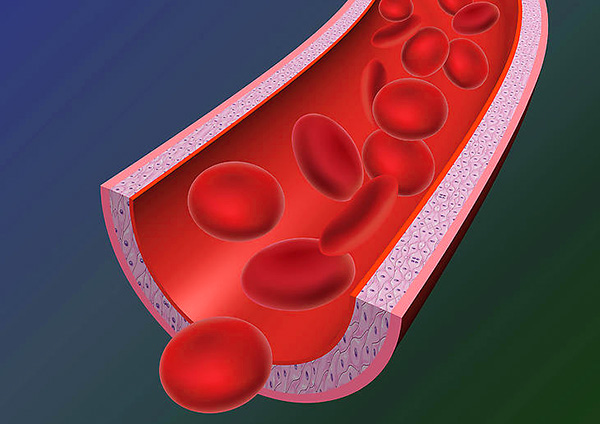
It is believed that the expansion of blood vessels after drinking alcohol can lead to the penetration of botulinum toxin into neighboring muscles.
It is possible that in some cases both of these actions occur simultaneously - a person has side effects that would not have happened if he hadn’t drunk alcohol, and the duration of the effect of the procedures was reduced. There is an opinion that a certain proportion of such undesirable consequences in modern cosmetology practice is precisely connected with the violation of the ban on alcohol after Botox.
However, in some people, alcohol does not affect the outcome of the procedures at all.
There are no accurate statistics and, in general, confirmed data on the undesirable effect of alcohol on the result of botulinum toxin injections. One cannot guarantee with certainty how much side effects will develop and whether they will develop at all. It is even possible that such an effect of alcohol on Botox is a myth based only on theoretical explanations. However, since there is no refutation of such conjectures, for complete safety, drinking alcohol after Botox injections is not recommended today.
Some myths about the effect of alcohol on the effectiveness of Botox injections
Among patients, there are other concerns about the effect of alcohol on the effectiveness of botulinum toxin therapy, however, they are not even theoretically justified and are considered precisely as myths.
In particular, fears are known that alcohol completely neutralizes Botox, which makes the procedures completely ineffective - after them not only wrinkles do not disappear, but their severity is not even weakened.
In reality, alcohol cannot act like this: if Botox gets into the muscle, the neurotoxin will still penetrate the nerve cells and act, therefore, a noticeable effect from the procedures will appear. The complete lack of action of botulinum toxin is sometimes associated either with the individual characteristics of the body, or with incorrect procedures and gross non-compliance with the rules of rehabilitation after them. That is, alcohol can contribute to a weakening effect, but it is not able to completely eliminate this effect.
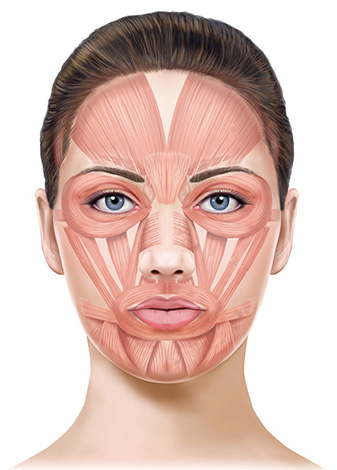
If the procedure is carried out correctly, and botulinum toxin gets into the muscle, then the effect of the injections will be independent of alcohol intake.
Another myth is that alcohol supposedly enhances the toxic effect of botulinum toxin. It is known that botulinum toxin is one of the strongest poisons in the world, and its introduction into the body scares many patients. Not very well aware of how botulinum toxin will react with the components of an alcoholic drink, many people fear a possible increase in its toxic qualities.
In reality, the direct interaction of botulinum toxin and the components of an alcoholic drink is practically excluded, and there is no reason to fear an increase in the "poisoning" effect of the drug. Moreover, in those microscopic doses at which it is introduced into the muscles during injection.
On a note
But the really possible effect is a standard poisoning by the alcohol itself, sometimes against the background of side effects of botulinum therapy. It is known, for example, that after Botox injections a flu-like syndrome often develops with signs of general intoxication of the body, with an increase in temperature and malaise. If we add to this state the consequences of profuse libations, with nausea and vomiting, then a person's well-being can be very unimportant.
There are other concerns. For example, patients believe that drinking alcohol can provoke an allergy to Botox, or lead to the opposite effect as desired: the severity of wrinkles will increase. These conjectures have neither theoretical nor practical confirmations, and therefore can be considered typical myths.
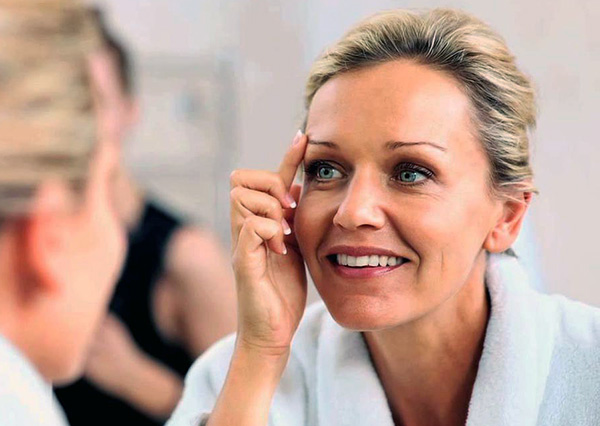
The assertion that if the ban on drinking alcohol after Botox injections is not observed, the effect of the latter decreases, has no good reason.
Feedback:
“I don’t remember how many times Botox did, I always followed the doctor’s instructions, everything was always as the doctor promised - I got on time, I kept the right time. Once gave slack, or on the second, or on the third day, drank a bottle of beer. And once Botox did not get up at all, in general there was no effect from him. Then she repeated the injections - everything is fine. Then it was such that I drank wine or cognac not immediately, but in 5-10 days. Then the action ended faster, it was necessary to inject it after 6 months, as usual, but after 4. Now I don’t drink at all, I don’t even allow champagne, I go to injections every 7-8 months ... ”
Nadia, Torrevieja
What are the consequences of drinking shortly before or after injections?
According to the main point of view, alcohol intake after Botox injections can provoke immobilization of those muscles that were not originally planned to undergo botulinum therapy.
As a result of this action, depending on the location and dose of Botox, the following effects may occur:
- Ptosis (omission) of the upper eyelid, up to the complete closure of the eye - this side effect in varying degrees of severity itself develops relatively often after the procedures, and alcohol intake can enhance it;
- The omission of the upper eyebrow or both eyebrows with the characteristic effect of a “crying” face, if injections were made in the forehead;
- On the contrary, raising eyebrows if antagonists of the frontal muscle were immobilized. There is the effect of “Mephistopheles eyebrow”;
- The omission of the corners of the lips and the effect of the "sad face";
- The effect of a “wax face”, “mask”, in which the muscles are immobilized so that the patient’s facial expression is smeared altogether when expressing emotions.
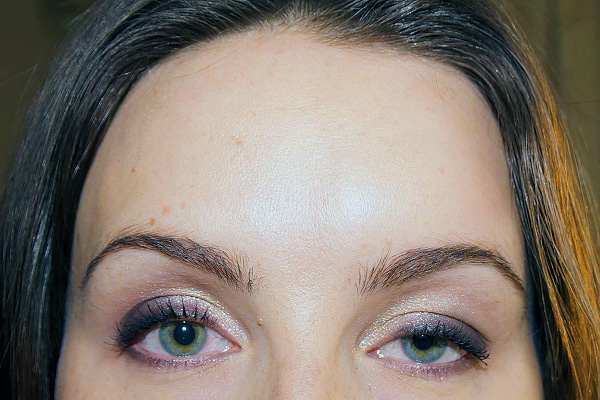
The omission (ptosis) of the upper eyelid is one of the most common side effects of botulinum therapy, while alcohol can also play a role in its occurrence.
In many reviews, patients, on the contrary, report that after taking alcohol, the effect of Botox was significantly weakened, or the effect of the procedures did not appear at all.
Also, alcoholic beverages can provoke the appearance of various cosmetic defects at the injection sites of botulinum toxin. There may appear swelling, bruising, bumps, which, although they disappear in a few days, but during this time the face is not exactly decorated.
Finally, alcohol can enhance many of the side effects of botulinum therapy - dizziness, general swelling of the face, nausea and dry mouth, pain at the injection sites, and others.
It is also useful to remember that alcohol weakens the patient’s control over his actions. If even the drink itself does not affect the Botox effect in any way, a person in a state of intoxication may forget that after injections he should not go to bed, he should not rub his face and bathe in the bath, move a lot. It is enough to “rub one's head” several times actively rub your face (for example, with a towel) or succumb to persuasion of friends to go to the bathhouse - and many undesirable consequences of botulinum therapy will appear precisely from such violations of the rehabilitation period.
Nevertheless, all these consequences are largely determined by the individual response of the patient to both Botox and alcohol. If one person does not have such a reaction at all, then the other side effects can be very pronounced.
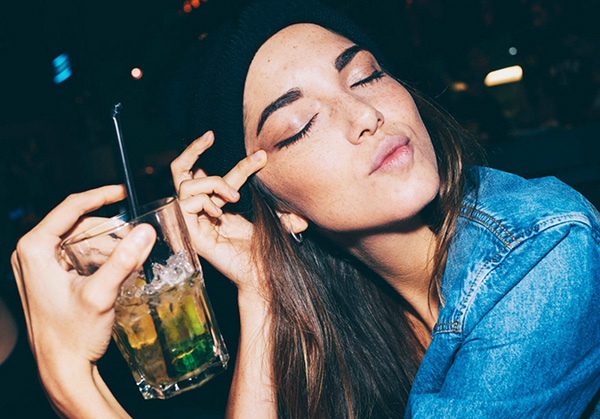
It is important to understand that drinking alcohol reduces self-control, and a person under his influence may violate strict prohibitions after injections.
Feedback:
“Botox has been stabbed several times and noticed that if I allow at least a glass of alcohol somewhere in the week after the injections, or go to the gym or dance, then everything, 100%, will appear in 3-4 months wrinkles. And if I control myself, then everything is fine, it’s worth almost a year. ”
Alena, St. Petersburg
The effect of alcohol on other botulinum toxin preparations (Botox analogues)
According to official instructions, alcohol should not be consumed shortly before and for some time after injections of any botulinum toxin preparations. This is true for Botox, and for its analogues - Dysport, Xeomin, Mioblock, Relatox and other drugs.
Due to the lack of evidence, it cannot be argued that taking alcohol differently affects the effect of different drugs of neurotoxins. Moreover, due to the individual reaction to the procedures and to the alcohol itself, the effect of such a “breast-taking” can be completely unpredictable.
On a note
There is theoretical reason to believe that alcohol intake will more strongly affect the action of Xeomin than the effect of drugs based on a complex of botulinum toxin with auxiliary proteins.It is believed that Xeomin itself, due to its small molecular weight, is more mobile and more likely to “spread” from the injection site than funds with large and massive molecules. Therefore, the likelihood of increased diffusion under the influence of alcohol is supposedly higher. But in fact, the difference between the pharmacodynamics of Xeomin and other drugs could not be found, and therefore such assumptions with high probability are only theoretical guesses.
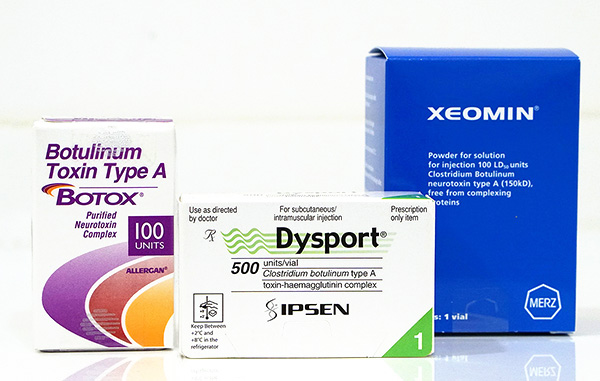
There is no evidence that alcohol affects the effectiveness of Dysport, Xeomin and other botulinum toxin injections in different ways.
Alcohol affects the effects of mesobotox procedures in the same way as the effect of introducing botulinum toxins into the muscles. Since, in principle, the dynamics of neurotoxin in mesobotox differs little from the distribution of this substance during classical injections, the effect of Botox on these procedures will be approximately similar (that is, until the complete absence of such an effect).
Feedback:
“Somehow I did not notice the difference between Botox and dysport. They say that dysport is a type of diluted botox, it needs to be pricked more for the same result. I don’t know how much they pricked me, but they did it for 1000 rubles cheaper than with Botox, but the result is the same, it has been already 5 months and is very strong. And I was not careful this time. When I set Botox, there were strictly no saunas, fitness or alcohol for 10 days, but here exactly on the eve of the day I put the child’s name on it, so the next day I took a sip. But it didn’t affect anything. ”
Oksana, Tyumen
How long can I not drink before and after the procedures?
Traditionally, it is not recommended to drink alcoholic beverages 3 days before Botox procedures and within 10 days after them. For three days, the body of a healthy person completely neutralizes the effect of alcohol on the circulatory and nervous systems and muscles. As for 10 days after injections, botulinum toxin has completely "embedded" into nerve cells during this time, and alcohol will not be able to affect the further effect of its action.
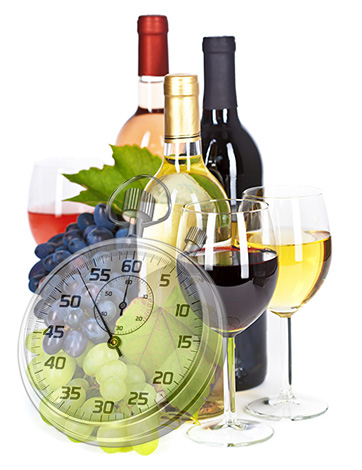
Most often, doctors do not recommend drinking alcohol 3 days before the procedure and 10 days after it.
If these terms are not observed, then the potential negative effect may depend on the strength of the alcoholic beverages themselves.
For example, the strongest ones - vodka, cognac, absinthe, whiskey - more stimulate blood circulation than those in which the proportion of alcohol is low - wine, beer, port. Consequently, the probability of influencing the effect of botulinum therapy when drinking strong drinks is higher than when drinking beer.
Nevertheless, here everything still depends on the individual characteristics of the body, and to a large extent - on the amount of alcohol consumed. Simply put, from 50 grams of vodka the effect can be less than from 5 bottles of beer.
What do the doctor's say?
It is useful to keep in mind that the instructions and prescriptions of doctors regarding alcohol intake can be diametrically opposite. Some experts strictly follow the official instructions of drug manufacturers and cosmetology guidelines that prohibit alcohol intake before and after injections.
Feedback
“My doctor strictly punished me not to drink a week anything alcohol, not even beer. But I somehow forgot it and on the second day after the injections of the disport I drank champagne with my friends from a child in DR. I was very worried later, I called her, but she passed) 4 months already, the flight is normal, everything keeps up. ”
Olga, Moscow
Other doctors are considering limitations such as survivals of the time when botulinum toxin was poorly researched, and statistics on its use were insufficient to formulate specific conclusions. From their point of view, then, at the dawn of the use of botulinum toxin in cosmetology, alcohol became one of the prohibited products for safety, only as a precaution.
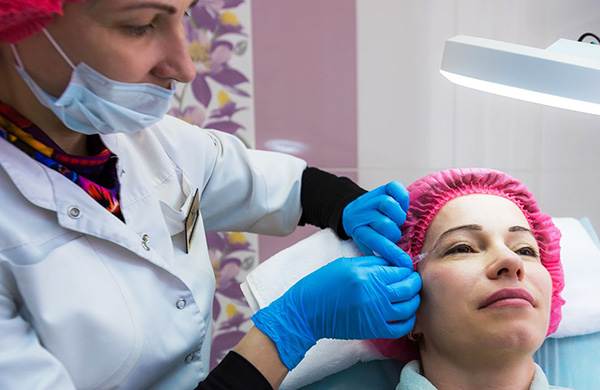
The opinions of doctors regarding the prohibition of alcohol after the introduction of Botox injections are mixed.Most adhere to the official instructions of manufacturers prohibiting alcohol, others - consider such a ban only as a precaution.
Today, when there is a lot of evidence on the use of Botox and other similar drugs, there are certain statistics and personal medical experience. And for many experts, this experience shows that the frequency of side effects from taking alcohol after botulinum therapy does not exceed the same frequency without taking alcohol, and in general, alcohol and injections of neurotoxins are completely compatible with each other.
Feedback
“I asked my doctor why alcohol is not allowed after Botox. Not because an alcoholic) It was just interesting. The doctor did not say anything intelligible. But she clearly hinted that if in moderation, then it’s quite possible, the main thing is not to get drunk to hell and control yourself. And so the doctors are more reinsured ... "
Ira, Yekaterinburg
That is, some doctors are more loyal and either do not limit patients too much in trying to drink drinks, or significantly reduce the ban period, up to 1 day before therapy and 2-3 days after it.
Moreover, some cosmetologists even openly say that after Botox you can drink alcohol without any serious consequences.
Feedback
“As the French say, today you can combine botulinum therapy with even champagne. That is, the routes of administration of botulinum toxin and alcohol are different. We do not recommend wiping the injection site with alcohol and work with aqueous chlorhexidine, but if the patient wants to drink champagne in the evening - no problem, he can do it. This is a myth that has long been debunked ... "
G. Naumchik, cosmetologist
There are even cases when doctors recommend that champagne mark the successful completion of the procedure and “fix” the result.
Feedback:
“I asked my beautician whether it is possible to drink beer or champagne, she just told me that if her patients drink something alcohol that day, Botox grasps faster. Normally, 10 days is required for this, and after shampoo - it rises for 3-4 days. She advised me to have a drink in the evening. Well, what am I? Well, I do not mind)) "
Irina, from forum posts
How to be in this situation? It is most reasonable to do what the doctor who performed the botulinum therapy will say (not forgetting about his common sense). A cosmetologist is responsible for the result, and if he permits to “take a sip,” you can trust him. If strictly forbids, he has a reason for this, and it is better to follow his instructions. Moreover, nothing terrible will happen from several days of abstinence.
Soft drinks and alcohol-based medicines
As for the various non-alcoholic drinks, doctors are unanimous: you can drink them both before and after the procedure. Such drinks do not affect the effect of Botox. Occasionally, individual specialists may recommend that their patients not drink coffee during the day after the procedure, but this precaution is generally excessive.
Non-alcoholic beer, champagne, mojito, drinks such as kvass, light cider with a strength of up to 3% can also be drunk after botulinum therapy. Of course, observing a certain measure - if desired, you can drink enough kvass to get intoxicated.
It is not recommended to use various alcohol-based medications inside (tinctures, extracts). At a minimum, such products often contain more alcohol than standard alcoholic drinks, which means they can also affect the effect of botulinum toxin more strongly.
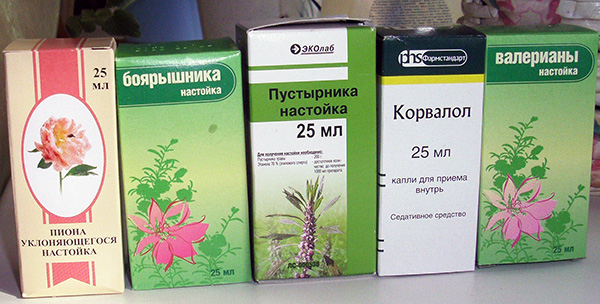
It is not recommended to use alcohol-based medications after botulinum therapy.
But another thing is more important: if the patient really needs to take medication for some time, it means that he is unwell, and in this state, conducting serious cosmetic procedures is not entirely justified. The situation here is similar to botulinum therapy with antibiotics or antipyretics.Putting Botox usually does not “burn”, and you need to be treated first, and already at the end of the course of taking this or that medicine, conduct botulinum therapy.
On a note
After Botox injection, it is not recommended to wipe the face with alcohol-containing lotions. Alcohol is absorbed into the skin and penetrates into the tissues underneath, expanding the blood vessels, which can provoke the same effect on Botox's effectiveness as when drinking strong drinks.
In conclusion, it is worth noting that even if the doctor allowed you to drink alcohol, specifically you can get into those few percent of the “lucky ones” whose alcohol caused side effects and negatively affected the result of the procedure. Therefore, for maximum safety, it is advisable to abstain from alcohol anyway - no one will be worse off from this.
The myth of banning alcohol after botulinum therapy
Useful Botox Video

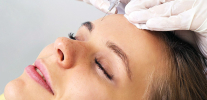
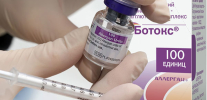
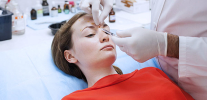
When I first used dysport in the forehead, the beautician said nothing to me about alcohol and its effect on the result. And the same day after the injection I drank a martini. As a result, the next day there was simply no effect from the procedure, but there were no ptoses, distortions of the face, overhanging of the eyelids and other things. With a liver it is normal too (did not hurt).
The next time she said not to drink for 2 weeks - I did so. True, then she went on vacation and there we drank wine every night. But the effect of the procedure was about 6 months. Moreover, wrinkles around the eyes did not increase even in the sun. A week ago, she again made a disport in the forehead, an eyebrow, eyes. But I did not know that you should not drink 3 days before the procedure. Therefore, I drank the wine the day before. The first 2 days there was no effect (I already thought that because of the wine the day before would not work). But no, the effect went on 3-4 days and by 7-8 days it became noticeable (the only thing is a little unpleasant that the forehead is like a lead).
On day 8 I drank wine. Let's see 😉
Some kind of alcoholic Elena!